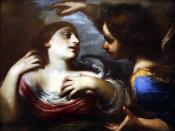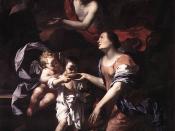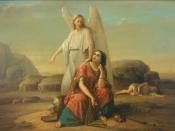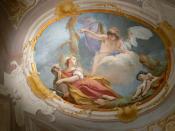Hagar, The Stone Angel. The main character in Margaret Laurence's novel 'The Stone Angel', Hagar, is one of deep complexity, instilled in her from early childhood. Raised by only her father and the maid, Auntie Doll, Hagar develops an ignorance towards emotions, her own, and other's. In Laurence's novel the stone angel introduced at the beginning, is a strong symbol of Hagar's personality and traits in many aspects. The stone angel is a direct representation of the Currie family pride, Hagar's pride and her stubbornness, as the angel was bought "â¦in pride to mark [Hagar's deceased mother's] bonesâ¦"(3). The angel was placed at the highest point in Manawaka, for all to see the wealth and prestige of the Currie family. As the stone angel her father bought had "the eyeballs [left] blank."(3), and was therefore blinded, unable to view the town below; Hagar was blind to the feelings and needs of others.
Hagar's pride sways her decisions to continuously disregard the feelings of those around her. Not only does she lack compassion, but Hagar does not display any emotions for she believes emotion shows weakness. Through the death of her husband and her son Hagar comes to terms with herself and realizes that she has been "transformed to stone" (81).
The stone angel placed in the cemetery of Manawaka was placed by Jason Currie "â¦in pride to mark [His deceased wife's] bones and to proclaim his dynasty, as he fancied, forever and a day." (3). The angel was purchased in Italy and brought to Manawaka, it "â¦was the first, the largest and certainly the costliest." (3) stone angel in the cemetery. The angel was placed in the cemetery to broadcast over the town, the Currie family's wealth and class. The stone angel is a direct representation of the Currie family's pride, as well as Hagar's pride and stubbornness. Hagar inherited her great amount of self pride from her father, this undesirable trait has caused her many hardships throughout her life. When Hagar's father sends her East to attend College she feels as though Matt deserved to go, not her. Proud that she has been given the opportunity to go, and frightened that her father's decision may change, "[Hagar] said nothing until [her] trunk was packed and all the arrangements made. Then [Hagar] spoke."(42). On the train to the East, Hagar shows the slightest signs of remorse, that she has taken the opportunity from Matt, but justifies it by reassuring herself that he wouldn't know. "â¦[Hagar] cried thinking of him, but, of course, he never knew that, and [she would] have been the last to tell him." (42). In many ways Hagar is a spitting image of her father, one of the many parallels is they both disapprove of their child's marriage. Hagar's father does not approve of her marrying Bram. "'There's not a decent girl in this town would wed without her family's consent,' he said. 'It's not done.'"(49) Despite her fathers wishes, Hagar, pride driven proceeds to marry Bram. "'It'll be done by me,' [Hagar] saidâ¦"(49) As a result of her stubborn decision Hagar looses contact with her brother Matt, and her father.
The stone angel with "the eyeballs [left] blank."(3) is blind, although placed overlooking the town, she cannot see. Hagar is figuratively blind in her ignorance towards other's needs and feelings. Hagar's pride prevents her from comforting her dying brother. In his last moments Dan wants to be comforted by his mother, Matt requests "'Hagar put [on the shawl] and hold [Dan] a while.'" (25). Hagar, selfishly cannot over come her pride to resemble such a "â¦meek woman [she'd] never seenâ¦from whom [Dan] inherited such a frailtyâ¦"(25). She completely dismisses Dan's dying wish, and fails to empathise with Matt, who is as well as Hagar loosing a brother. Once Hagar marries and has children of her own, she too like her father, favours the child that disappoints. Since John was born Hagar favours him over Marvin, although Marvin does everything his mother could ever need or want in a son, she is blind to his efforts. It is not until John disappoints Hagar, with his marriage proposal to Arlene, that he opens her eyes to how she has treated Marvin; "'always bet on the wrong horse,' John said gently. 'Marv was your boy, but you never saw that, did you?'" (237). It is not until after the passing of her favoured son, John, that Hagar lye on her death bed and she can tell Marvin "'You've not been cranky, Marvin. You've been good to me, always. A better son than John.'"(305). Hagar, like her father fails to take her children's feelings into consideration when they wish to marry. Hagar and Lottie put forth their best efforts to separate John and Arlene, casting aside their children's feelings. Just as Hagar's father disowned her for marrying "'[someone] common as dirt."'(48), although Hagar loved Bram. Hagar does not take a liking to Doris, Marvin's wife, either. Through Hagar staying with them in her old age, she continues to mistreat them both, showing them little respect and criticizing Doris. Even at ninety Hagar's pride prevents her from caring about her detrimental behaviour towards her sons marriage, and refuses to be put in the Silverthreads nursing home.
Hagar's mindset creating an inability to show any emotion is symbolized by the stone angel's heart of stone. Even as a young girl Hagar believed that showing emotion was a sign of weakness. "[Hagar] wouldn't let [her father] see [her] cry, [Hagar] was so enraged. He used a foot ruler and when [she] jerked [her] smarting palms back he made [her] hold them out again." (9) Throughout the novel, the character of Hagar does not cry in the presence of any one. After the passing of her favoured son, John, at his funeral she does not shed even a single tear. In the hospital after the immediate passing of John, Hagar does not allow herself to be comforted:[the nurse] put a well meaning arm around [Hagar]. "cry. Let yourself. It's the best thing." But [Hagar] shoved her arm away. [She] straightened [her] spine and it was the hardest thing [she has] ever had to do in [her] entire life, to stand straight then. [She] wouldn't cry in front of strangers, whatever it cost [her]. (242)Hagar's incredible ability to mask her emotions and save face eventually prevents her from sharing her feelings all together. After the funeral, once she returned home, the feeling of sadness had escaped Hagar and she was incapable of crying. Hagar has maintained the appearance of a strong character, as well as cold and distant. She does not show any emotions, not just sadness. Hagar secludes her feelings of enjoyment while making love to her husband Bram. "[Hagar] never let him know. [She] never spoke aloud, and [she] made certain the trembling was all inner." (81). After Bram died, Hagar still did not allow herself to cry. It was only later in life after the passing of both Bram and John that she became aware that she was "transformed to stone" (243).
The stone angel referred to in Margaret Laurence's novel depicts the main character, Hagar, in many ways. The stone angel is the Currie family pride, brought from Italy to proclaim Jason's dynasty. It is Hagar's pride that she travelled to the East for college. It is Hagar's stubbornness that ends her relationship with her brother and father, but begins her marriage to Bram. The angel has no eyes, as Hagar is figuratively blind, in that she is oblivious to other's needs and feelings. Her pride stops her from comforting her dying brother, showing no respect towards Dan, nor Matt. Hagar does not see that she has favoured the wrong son, John has to point it out to her, she cannot admit to Marvin, until she lay on her deathbed, that he was in fact the better son. Hagar's efforts to separate her son and his love shows a total disregard for John's smitten feelings towards Arlene. The stone angel has a heart made of stone, as it appears does Hagar. Since she was a young girl, she believed to show emotions meant that one was meek and feeble. Hagar never let her husband know that she enjoyed making love to him, she kept all the feelings to herself. She did not cry after the death of her husband, nor her son, nor did she allow herself to be comforted. It was not until later on in life that Hagar realizes that she was in fact "transformed to stone" (243).
Bibliography: The Stone Angel by Margret Laurence





